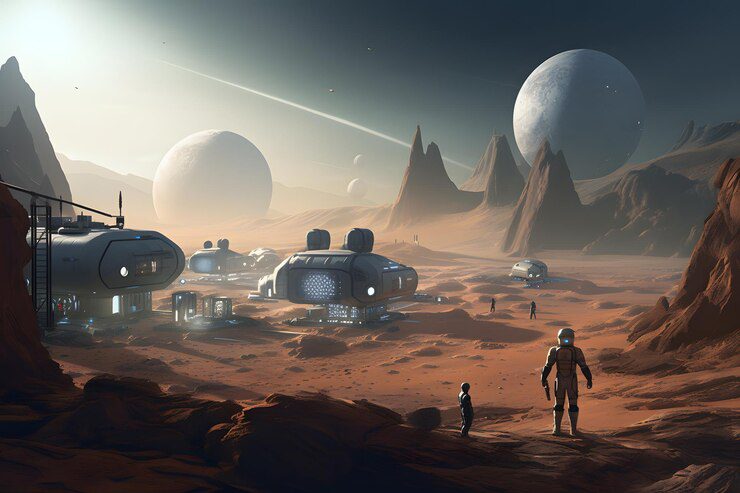Prepare for cosmic adventures, space enthusiasts! The ultimate frontier has evolved beyond past perceptions. Leave behind the imagery of lunar cowboys – the trajectory of space exploration is now fixed on Mars, the enigmatic crimson neighbor that has tantalized us with its promise for years. But is establishing a colony on Mars a monumental stride for humanity, or a perilous voyage into oblivion? Let’s delve into this odyssey of Mars and determine if the Red Planet is genuinely prepared to serve as our new abode.
The Enigmatic Allure of Mars
Our planet, Earth, acts as our vessel, and recently, conditions have been heating up considerably (concerns about climate change, perhaps?). Interstellar exploration transcends mere cosmic curiosity; it now focuses on securing a contingency plan for humanity. At first glance, Mars, with its sparse atmosphere and rusty terrain, may appear in need of renovation. However, consider this: Mars stands as the nearest planet to Earth with conditions that could potentially sustain life, even if it is merely microbial life. We have robotic rovers traversing the Martian landscape, transmitting data ceaselessly, and the discoveries are captivating. Hidden beneath the surface lies water ice, and despite its thinness, the Martian atmosphere offers some refuge from the harsh radiation of space.
The Obstacles We Must Navigate
Indeed, Mars holds promise, but let’s not gloss over the details: establishing a colony on another planet presents an entirely new set of challenges. The primary impediment? The daunting journey itself. Space exploration to Mars consumes months, requiring an extended confinement within a metallic vessel – akin to an intensified detox from social media. Astronauts would face the constant menace of radiation exposure, which can disrupt DNA more severely than a disastrous Tinder encounter.
Furthermore, there’s the issue of the inhospitable environment. Mars embodies a cold, arid expanse with an exceedingly thin atmosphere incapable of retaining warmth. Residing on Mars would resemble enduring the hardships of Mount Everest, albeit with diminished oxygen levels and an abundance of dust. Forget about reclining in a hammock and enjoying the vista – the initial Martian colonists will embody pioneers, erecting shelters, cultivating sustenance, and essentially constructing a society from the ground up. Picture a scenario akin to “Survivor” on Mars, devoid of the allure of a million-dollar prize.
The Technologies that Will Propel Us Forward: From Rockets to Automatons
The encouraging news is that interstellar exploration has become a prevalent theme (pun intended!), and experts and innovators are diligently devising technologies that could transform this science-fiction reverie into reality. Reusable rockets such as SpaceX’s Starship are reducing launch costs, rendering space exploration more accessible. 3D printing holds the potential to revolutionize the game, enabling colonists to fabricate habitats and implements using materials sourced from Mars. Let’s not overlook our robotic allies! Advanced automatons will play a pivotal role in establishing infrastructure before humans even set foot on the crimson soil.
The Societal Implications: A Small Step for a Colony, A Monumental Leap for Humankind?
Establishing a colony on Mars wouldn’t merely revolve around securing a new abode for humanity; it would signify a significant advancement in the realms of science and technology. The obstacles we’d encounter on Mars would push the boundaries of innovation across diverse domains, ranging from agriculture to sustainable living. It could also foster global collaboration on an unprecedented scale. Envision a world where nations collaborate not for earthly resources but to forge a fresh future on an alien planet. That exudes a profound sense of unity and cooperation.
Therefore, is Mars the next frontier for humanity? The verdict remains inconclusive. There are immense challenges to surmount, but the potential rewards are astronomical (pun intended, once more!). One aspect remains certain: the trajectory of space exploration is converging toward Mars, and it’s a journey we’ll all be observing with anticipation. Whether it embodies a monumental leap or a challenging endeavor is yet to be unveiled, but one certainty prevails: it promises to be an exceptionally thrilling expedition.







